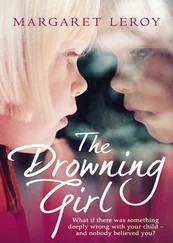‘She must have lost lots of weight since she’s been ill,’ I tell her. ‘She isn’t eating—she feels too ill to eat.’
Dr Carey leans towards me. Her immaculate hands are tightly clasped together.
‘What does she eat exactly?’
‘Today, she had a piece of toast for breakfast and she didn’t have any lunch.’ I know—I’ve looked in her lunchbox. ‘Yesterday was better. She had a bit of rice and some gravy for tea.’
I want to make it clear I’m not a worrier: that I know that children are tougher than we think, as the other GP told me; that rice and gravy really isn’t too terrible.
Still the pinched little frown.
‘Just rice?’ she says. ‘She should be eating meat. She needs her protein.’
‘Of course she does. But rice and gravy was better than before.’
‘We’re fortunate to have a nutritionist working in this practice,’ she says. ‘I think I should refer you to her for advice about what Daisy should be eating.’
‘But I know what she should be eating. Of course I do.’ I think of all the books I’ve bought on bringing up children, books with cheerful covers and energising titles— Eco Baby, Creating Kids Who Can. ‘It’s just that she won’t, she can’t. She feels too sick to eat. She hasn’t eaten properly since Christmas.’
She shakes her head a little. I feel this conversation slipping away from me.
She turns to Daisy, looks at her; there’s something she’s working out. She fiddles with the wisps of hair that grow in front of her ears.
‘Daisy, I wonder if you could tell me a bit about school?’ she says then. ‘Is it all right? D’you like it?’
‘It’s OK,’ says Daisy.
‘Is anything worrying you?’
Daisy shakes her head.
‘You’re sure?’ says Dr Carey. ‘Sometimes it’s hard to talk about these things.’
Daisy frowns. I see how she’d like to help, to give the answer that Dr Carey wants, but she can’t think of anything. She twists her fingers in Hannibal’s greying wool. He’s dirty; she’ll never let me wash him in case he loses his smell. Here in this blue sterile place, I find his greyness embarrassing. I worry that Dr Carey will think that I never wash things properly, that I am messy, sluttish, not a proper mother. Daisy doesn’t say anything.
Dr Carey turns to me. ‘You know, Mrs Lydgate, I’m wondering whether we should treat all this as psychological. ’ She says this with a kind of finality, as though it is an achievement.
Panic seizes me.
‘But nothing traumatic has happened to Daisy. It started when she had flu.’
‘But, you see, she looks so miserable,’ she says. ‘She looks all pale and hunched up.’
‘She’s unhappy because she’s ill,’ I tell her.
Dr Carey ignores this, leans a little towards me. ‘Tell me, Mrs Lydgate, is everything all right at home?’ Her voice is hushed, confiding: as though she thinks that Daisy won’t be able to hear.
‘Everything’s fine,’ I tell her.
‘You’re living with your husband?’
‘Yes.’
‘And how do you both get on?’
‘We get on fine,’ I tell her.
My coat is damp from the rain: I am chilled through.
‘You’re sure? You don’t have awful shouting matches in front of Daisy?’
‘No, we don’t. We don’t have awful shouting matches at all.’
I’m trying not to get angry; I know that if I get angry she won’t believe what I say.
‘Because if you do,’ she says, ‘Daisy’s sure to react.’
‘Really,’ I say again, ‘we get on fine. It’s nothing like that. I just know Daisy’s ill.’ I take a deep breath, try to keep my voice level. ‘I want her to be referred to the hospital.’
There’s a pause, as though this is entirely unexpected. She looks unsure; I see how young she is.
‘Please,’ I say. ‘She isn’t eating, she always feels so tired. I think we should see a paediatrician.’
‘All right, then,’ she says, but with reluctance, as though she’s been constrained.
She’s writing in her notes now. ‘I’ll refer you to Dr McGuire at the General,’ she says. ‘They’ll write to you with the appointment. I’m afraid there’s quite a waiting list. In the meantime, we’ll get all the blood tests done. You can come in on Thursday and the nurse will take the blood.’
As we go she gives Daisy a lollipop from the jug on her desk.
We walk back to the car, which is parked down the end of the road. There are green fresh smells of spring but the rainbow has faded.
‘She was really nice, wasn’t she, Mum?’ says Daisy.
‘I’m glad you liked her.’
‘I did,’ she says. ‘She was kind.’
She starts to unwrap the lollipop; I have to take Hannibal. We stop for a moment because it’s hard to do; the paper is firmly stuck to the sugary surface. The lollipop is veined with purple and red, the colour intense as nail varnish. I think of additives but don’t say anything.
She rips off the last scrap of cellophane.
‘There,’ she says with satisfaction.
She takes one careful lick. We walk on for a bit, the lollipop held in front of her, like some precious thing.
‘Is it all right if I leave this, Mum?’ she says then.
‘Of course.’
As we pass the bus stop she drops it in a bin.
Daisy can’t sleep; she says she feels too sick. I sit her up, and prop her against the pillows and smooth her hair. ‘We’ll crack this,’ I tell her. ‘We’ll get you better. I promise. Soon it’ll be over.’
I read to her from the fairy-tale book, the story of Rapunzel, who was trapped in a tower by the witch, her mother, and let down her hair to a prince. Sometimes Daisy spits in a tissue.
Sinead comes to the door. She needs me to test her on her homework.
‘It’s false friends. For crying out loud. How can any word of French be your friend?’
‘I’ll come when Daisy’s asleep,’ I tell her.
I read till Daisy’s head is drooping, as you might with a very young child. Her eyelids are shut, but flickery, tense; she could so easily wake. Sinead looks round the door again. I put a warning finger to my lips. She mouths melodramatically, ‘My vocab, my vocab.’ I whisper she’ll have to wait. Eventually Daisy’s breathing slows and she sinks down into the pillows. I slip off my shoes and creep out like a thief. I sit with Sinead and test her on the words. She isn’t very confident, but it’s nearly ten, she’ll never learn them now. I tell her to go to bed.
Richard has his meeting and he won’t be back till late. I pour myself some wine, and try to imagine him there. When I think of it, this world of his that’s so mysterious to me, I always see men in suits all sitting round a shiny mahogany table, and heaps of papers in front of them covered in cryptic figures, and the coffee brought in by Francine, his glamorous PA. I met Francine once at a party at Richard’s office; she was wearing a rather impressive dress, demure in front, right up to her neck, but almost completely backless.
I take my wine into the living room. It’s cold in here tonight: the heating’s been off for most of the day, and the house won’t seem to warm up. I pull the curtains, shutting out the night, but chill air seeps up through the gaps in the floorboards.
I don’t turn on the main light, just the lamps on the little tables on either side of the fireplace. There is darkness in the corners of the room. The masks we brought back from Venice are lit from below, so the lines of the pottery are etched in shadow. I chose them because they charmed me, with their hints of a seductive world of carnival and disguise. But when Daisy was little, and mothers and children were always coming for coffee, I had to take them down; children seem to be often afraid of heads apart from bodies—it’s probably something primal—and there were toddlers who’d burst into tears if they saw them. The black one is a little macabre, sinister in an obvious way—it’s the fairytale crone, Baba Yaga perhaps, the glossy surface recreating the sagging folds of old flesh—but tonight I see it’s the white one that is more frightening: it’s simpler, almost featureless, a face that is an absence.
Читать дальше












